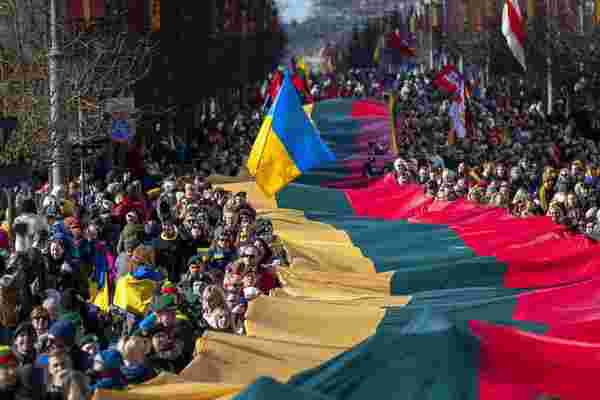‘It will get worse’: Euro inflation adds to Lithuania’s economic woes
Driving a taxi in Lithuania’s third-largest city, Klaipeda, Antanas Jonauskas feels the genuine impact of the Baltic nation’s status as the bloc’s worst-hit by Europe’s inflation crisis.
“For one euro, now you cannot buy even a pack of roasted peanuts for a snack. The prices are just out of control and there is no glimmer of hope that things can get better soon,” he said.
In March, Lithuania had the highest inflation rate in the EU of 15.7%, according to Eurostat, driven by energy costs that surged by almost 13% in Europe in the last month alone.
Lithuania stands out as the top leader of that grim ranking, and the rocketing price of goods while the euro keeps faltering is on the mind of most of its citizens.
Jonauskas’ taxi company has bumped up the fare rates, but his income has stalled due to a number of issues the country has faced over the past several years.
“I see way fewer passengers nowadays. The city has bled tangibly due to emigration. COVID-19 kept all locked up at home, some people are still afraid to get in to the taxi,” he said.
“The sanctions mean we will not see Russian and Belarusian tourists anymore and the Ukrainians, who flooded the city, are penny-pinching. That’s the new reality.”
‘A crazy rollercoaster’
Mainly boosted by increases in energy and food prices, inflation was up 1.5% compared to the previous month, standing at 15.7% in March — the highest since October 1996.
Housing and utilities are up 37.5%, food and drink 17.1%, while transport costs have soared by 22.1%. On a monthly basis, consumer prices were up 2.4% in March, again seeing the biggest rise since January 2009 due to higher prices for everything from fuel to clothing to dairy products.
Arturas Timukas, owner of the Resort Pub in Palanga, a retreat on the Baltic Sea, said he regularly had to update menus to reflect the rising prices he pays to suppliers.
“Every time my wife calls the suppliers, I feel uneasy — I know we will be hearing new, higher numbers,” Timukas said.
Meanwhile, a local construction company owner, who introduced himself as Marius, said the building sector is on a “crazy rollercoaster”.
“When going to bed every evening, I cannot be sure that things will be same in the morning,” he said.
The war in Ukraine has not just impacted the price of materials and the supply chain generally but the hiring of labour. Workers frequently insist on contracts that peg their salaries to the rising living costs.
“This is what no builder will do, so I have to come up with other perks and incentives. And those not bound by contracts want to have their pay reviewed nearly weekly, adjusting it to inflation,” Marius said.
 People carry a giant Lithuanian flag and Ukrainian flag during a celebration of Lithuania’s independence in Vilnius on 11 March 2022AP/Copyright 2022 The Associated Press. All rights reserved
People carry a giant Lithuanian flag and Ukrainian flag during a celebration of Lithuania’s independence in Vilnius on 11 March 2022AP/Copyright 2022 The Associated Press. All rights reservedDarius Antanaitis, the owner of UAB Ostara, a company assembling state-of-the-art electric buggies, told Euronews that Lithuania’s record-high inflation is because of the country’s incapability to produce cheap electricity.
“Lithuania’s decision before the accession to the EU to shut down its nuclear power plant has been the biggest mistake,” he said. Not building new ones was another mistake, Antanaitis insisted.
“If we had pursued it, the electricity would be much cheaper now and we would not have seen the nuclear station in Belarus, 50 kilometres away from Vilnius.”
Grappling with the effect of inflation on his business, he has shelved or put off some projects, focusing on the most key ones and on paying salaries on time.
“My daily headache is to think how to retain all the high-skilled value-added professionals on my team and how to compensate the losses they incur from rising inflation,” Antanaitis said.
He does not rule out the possibility of adjusting the salaries in his company for inflation — something that he cannot offer at the moment. “This is what many workers ask for now,” he explained.
War to impact exports, national bank warns
With energy prices at a record-high, Lithuania saw heating bills rise between 100 and 150% for households last winter.
The consumption of Russian gas has been declining in the country over the last couple of years –- from 32% in 2019 to 26% in 2021.
But Lithuania’s energy dependence on Russia was one of the highest among European countries before the Russian invasion of Ukraine on 24 February. Just last year, the country paid over €3 billion for Russian oil, gas, and electricity, experts said.
According to Lithuania’s Luminor bank economist Žygimantas Mauricas, Lithuania’s energy dependency on Russia was “probably the highest in the EU” until recently.
This is reflected in the international trade figures, showing that the country imports way more oil, gas, and electricity than it exports.
“In the fourth quarter of last year, the oil product trade deficit exceeded €400 million. There were some €300m on natural gas, and the record-high expenses on electricity, standing at around €400m euros,” Mauricas told Lithuanian news wire service BNS in early March.
With the outbreak of the war, Lithuania was one of the first EU countries to announce abandoning Russian gas and electricity.
 People walk past a former KGB building in Vilnius on 23 February 2022Mindaugas Kulbis/Copyright 2022 The Associated Press. All rights reserved
People walk past a former KGB building in Vilnius on 23 February 2022Mindaugas Kulbis/Copyright 2022 The Associated Press. All rights reservedThe country’s national bank said that the direct impact on the country’s economy would be limited due to reduced ties with Russia.
However, it admitted that the Kremlin’s aggression in Ukraine would negatively impact the Lithuanian economy through reduced exports, possible disruption to imports of raw materials, and rising energy prices.
This is particularly problematic considering that exports to Russia, but also Ukraine and Belarus comprise about 15% of the country’s total.
“Complete loss of exports to these markets in 2022 [through] 2024 would lead to a slower growth of the Lithuanian economy of up to three percentage points,” the Bank of Lithuania said in a statement.
“It is likely that restrictions on imports from these countries will cause temporary disruptions to production due to a shortage of the necessary raw materials, but even once alternative providers are found, the cost of acquisitions of these raw materials will be higher,” the central bank said.
The economic consequences of the war in Ukraine for Lithuania’s other export partners will lead to a decline in aggregate foreign demand, which will worsen the exports’ growth prospects, the country’s central bank warned.
Oil and natural gas continue to rise in price due to the refusal by Western countries to purchase Russian resources, which will lead to increased electricity, heating and transport costs for all the economic sectors.
The bank stated that this would further boost consumer price inflation, which could only be mitigated by a sharper fall in energy prices on exchanges. In addition to those factors, the Lithuanian labour market will be possibly impacted by the increasing flow of Ukrainian refugees to Lithuania.
Government sees war as distraction from economic woes, critics claim
Analysts say the inflation, coupled with the ongoing pandemic, the migrant crisis along the 670-kilometre Lithuanian-Belarusian border, and the inevitable repercussions to the country’s economy from sanctioning Russia and Belarus, will combine to backfire against the country’s Liberal-Conservative government.
However, the blame game remains overshadowed by the war in Ukraine for now.
The fallout against the ruling coalition is inevitable, Vytautas Dumbliauskas, associate professor at the Mykolas Romeris University in Vilnius, told Euronews.
“After the war is over and Ukraine comes out as the victor, the issue of inflation and a sagging economy will start haunting the government. It does not have much to say besides excusing itself with the global processes in economy, the war and the pandemic,” Dumbliauskas said.
 People walk near the Three Crosses in Vilnius, 28 February 2022AP/Copyright 2022 The Associated Press. All rights reserved
People walk near the Three Crosses in Vilnius, 28 February 2022AP/Copyright 2022 The Associated Press. All rights reservedDainius Kepenis, an opposition MP from the Farmers and Green fraction, told Euronews that the government, which has been plagued by low support throughout its term according to him, “could not have hoped for a better serendipity” than the war.
“When it started, the eyes of many Cabinet members and the ruling MPs were gleeful, not teary. That’s an observation many have made. The situation in Ukraine gave the government a much-needed break from all the headaches and allowed it to sweep acute issues under the rug, citing the war,” Kepenis claimed.
The national emergency in Lithuania declared on 24 February — a measure seen by critics as inadequate and playing in favour of the government — has been extended until the end of June, as it is still necessary while Russia’s brutal military aggression in Ukraine continues, according to the Speaker of the Parliament Viktorija Čmilytė-Nielsen.
Meanwhile, many are wondering whether there is a way out of the financial crisis and when the economy might show signs of recovery.
Mauricas says that inflation in Lithuania should peak in May or June, followed by deflation in 2023.
According to him, inflation would be driven down by tighter fiscal and monetary policies in advanced countries, decreasing pressure on global supply chains and the expected fall in prices for energy resources and other commodities.
However, many remain sceptical. “The worst is yet to come. You will see,” said the Klaipeda taxi driver Antanas Jonauskas.
